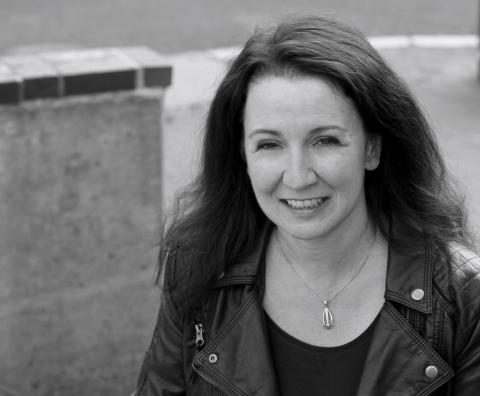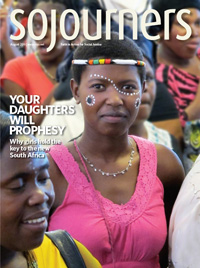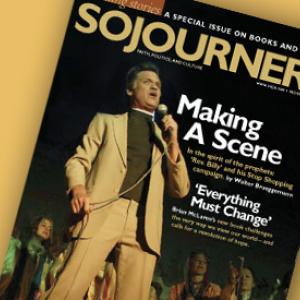
Kimberly Burge is author of The Born Frees: Writing with the Girls of Gugulethu, about girls growing up in post-apartheid South Africa.
Posts By This Author
Ibram X. Kendi Is Showing Believers and Nonbelievers Alike How to Become Antiracist
SOMEWHERE IN AMERICA, surely there lies a graveyard filled with racist bones. It’s abandoned and dry as Ezekiel’s valley. No one is asking if these bones can live, least of all the many people who proclaim they don’t have a racist bone in their body. Better they turn to dust, lest they be DNA-tested and matched.
But Ibram X. Kendi is laying claim to his. Founding director of the Antiracist Research and Policy Center at American University in D.C. and award-winning author of Stamped from the Beginning: The Definitive History of Racist Ideas in America, Kendi identifies his own racist beliefs and actions in his latest book, How to Be an Antiracist, a deeply researched blend of history, sociology, law, and memoir.
“One of the central messages in How to Be an Antiracist is that we’re all on a personal journey to move away from our upbringing in a racist nation. And that journey must be deeply self-reflective and self-critical,” Kendi told me. “This is hard work. It’s easy to be racist. It’s extremely hard to be antiracist. But it’s possible, and I wanted to model how we could do that.” Kendi defines a racist as anyone (including a person of color like himself) “who is supporting a racist policy through their actions or inaction or expressing a racist idea.” Likewise, an antiracist is anyone “who is supporting an antiracist policy through their actions or expressing an antiracist idea.”
Remembrance and Repentance
FOR A GOOD SIX MONTHS, I didn’t notice the words carved above the grand sanctuary entrance to Mount Vernon Place United Methodist Church in Washington, D.C. The letters stand guard over the doors like sentries: Methodist Episcopal Church, South. The words meant nothing to me.
In February, the General Conference of the UMC voted to strengthen the enforcement of denomination rules against ordaining LGBTQ Christians and performing marriage ceremonies for LGBTQ couples. But Mount Vernon Place (MVP) has long described itself as “young and old, gay and straight, liberal and conservative, housed and unhoused, people filled with faith and people who know doubt.” It struck me as a place I could fit in and be challenged.
On my first visit, I was intrigued by a bulletin notice announcing the launch of a racial-justice book group—especially since the congregation is predominantly white. So I joined.
Book group leader Caroline Anderson-Gray, white and in her 30s, has been a member at MVP for four years. I asked her why she started MVP’s racial justice conversation with a book group.
“In the summer of 2016, as reports of police officers killing black citizens seemed to be at the top of the news every other day, our minister raised the idea of a racial-justice reading group,” said Anderson-Gray. “I believe that to be Christian is to be committed to dismantling structures of hatred and inequality, so a reading group on the subject of racial justice at church made a lot of sense to me. By the time we had our first meeting, the presidential election had occurred, and the need for such a group was more urgent than ever.”
A book group may not seem like much given the rise of social terror. But small discipleship groups are a very Methodist practice—and this one opened a space for transformative conversations. Eight to 12 people, a microcosm of the church, gathered every other month to read and learn. One man, a Canadian expatriate, spoke about his difficulty in understanding his new country considering the experiences of his African-American husband. Una Song, an MVP member for three years, said that reading Patricia Raybon’s My First White Friend helped Song clarify her own experiences of exclusion in a country dominated by white privilege.
Flags Change. Then What?

Image via MyImages - Micha/Shutterstock
Flags are only symbols, of course. Chucking one for another does not automatically overhaul a society’s deeply entrenched structural oppression. Lowering a flag and relegating it, belatedly, to a museum does not change people’s hearts and minds. Under South Africa’s new flag, the Born Frees are inheriting a country awash in contradiction. How free can this generation be with one of the highest levels of income inequality in the world? With the rampant violence that especially plagues black townships and is frequently directed against women and girls? With the remnants of a broken school system that was not designed to educate all its citizens equally?
Songs Before the Cataclysm
SOME OF THE WORLD’S oldest spiritual music has been recorded, and thus preserved—just in time—thanks to a punk-rock drummer/photographer.
The ancient city of Aleppo, Syria, is a UNESCO World Heritage Site and considered one of the oldest continuously inhabited cities in the world. Since 2012, when the Syrian civil war moved in to the area, Aleppo has been ravaged by fighting, and many of its inhabitants killed or made refugees.
Several years before the war began, Jason Hamacher embarked on an accidental odyssey to capture the sights and sounds of Aleppo, not knowing he might be the last to do so before the Old City, the historic city center, was destroyed.
Hamacher moved to Washington, D.C., in his teens and spent his high school years exploring a dual identity that would stick: Christian and son of a Southern Baptist preacher, and drummer in D.C.’s vibrant hardcore punk scene. Since 1993, he has recorded and toured with Frodus, Decahedron, Battery, and Regents. When he found himself between bands in 2005, he and some fellow musician friends who were also Christian vowed to search for new sounds in old spiritual music.
A Farm Grows in Brookland
ON A TWO-ACRE parcel of land in Washington, D.C., tucked behind the provincial house of the Missionary Oblates of Mary Immaculate, Gail Taylor offers a visitor dragon’s lingerie.
“It kind of looks like fishnet stockings—that’s how it got the name,” Taylor says, holding up the heirloom snap bean, its pale yellow-green hull mottled with purple.
Across the aisle, Jack Be Little miniature pumpkins hide under leafy canopies. There are tomatoes and mustard greens, eggplant and legumes, lettuce and squash. “We’re doing a lot of intercropping and companion planting now,” Taylor says. So asparagus lies next to parsley, both behind a bed of raspberry bushes. Flowers also abound, with bursts of hot pink blossoms and purple clover that beautify the landscape while attracting pollinators.
For nearly 100 years this area, owned by the Oblates, a Catholic religious order, was only a grass field, a place where the priests would sometimes play soccer. In 2011, Taylor approached an Oblate priest and requested use of the land. “They were amenable and excited,” Taylor says. “They’re ecologically forward thinking, and they lead the Catholics in creation care.”
The space has become a location for Three Part Harmony Farm, the urban agricultural project Taylor established in D.C. She hopes it will become the first commercial farm in the District of Columbia since 1939, producing locally grown food to be sold in stores and farmers’ markets. First, there are some hurdles that the 36-year-old farmer must clear.
The Innocence List
There are many reasons to abolish the death penalty. Innocents on death row may be the most compelling.
'You Strike a Woman, You Strike a Rock!': The Daughters of South Africa Speak Out
 The lost art of reading might be in danger, but I'm happy to report that the desire to write remains strong, at least with Amazw'Entombi ("Voices of the Girls").
The lost art of reading might be in danger, but I'm happy to report that the desire to write remains strong, at least with Amazw'Entombi ("Voices of the Girls").
This creative writing club in Gugulethu, a township 10 miles outside Cape Town, South Africa, drew together nearly two dozen expressive girls, ages 13 through 20, each week for a year. With the help of a prompt -- a phrase or a short piece of writing to get started -- together the girls and I wrote. Like athletes in training, we built up from an initial three minutes of writing to, eventually, 20 minutes and sometimes longer when they asked for more time. Then we would go around the circle where we sat and read aloud what each of us wrote.
One week, the girls collectively wrote their manifesto (below), and staged a reading when the Flip camera came out. Then Sharon added her own contribution, "Proudly South African" (to hear her read, click here). She's now enrolled in her first year studying psychology at the University of Cape Town. I'm secretly hoping she switches to journalism.
'Your Daughters Will Prophesy'
In the new South Africa, the future is speaking in the voices of the girls.
Songs For Hard Times
The Better Angels, by John Francis. Horse and Rider/Dualtone.
Mother Liberia
Pray the Devil Back to Hell, by Gini Reticker and Abigail E. Disney.
Through the Laughter and the Tears
God is in the details—or is it the devil? Authenticity certainly lurks there, which is abundant in the best fiction. Uwem Akpan understands this. When writing about Rwanda, he wanted to get the details right. Marriage customs, traditional dress, the color of the earth—the small, everyday matters that make a story come alive and that inhabitants of a place will spot right away if a writer gets it wrong. So Akpan attempted to travel to Rwanda for research.
But his superiors wouldn’t let him take the trip—they preferred that he remain at his seminary in Kenya. He was resigned to asking questions of his Jesuit brothers in letters and e-mails, and left to imagine Rwanda’s earth.
Akpan is most likely the first Nigerian Jesuit priest to have two stories published in The New Yorker, that Holy Grail for short story writers. “An Ex-Mas Feast” and the Rwanda story “My Parents’ Bedroom” are both featured in his first collection, Say You’re One of Them, published last June by Little, Brown and Company. In two novellas and three stories, he juxtaposes startlingly lucid writing and imagery with nearly unspeakable situations—child trafficking, genocide, religious and tribal divisions and violence, and desperate poverty. Each of the stories takes place in a different African country, and all are told through the perspectives of children.
Here’s the voice of 8-year-old Jigana at the opening of “An Ex-Mas Feast”: “Now that my eldest sister, Maisha, was 12, none of us knew how to relate to her anymore. She had never forgiven our parents for not being rich enough to send her to school.”
The Music of Loss
Lucinda Williams' singing voice inhabits at least a dozen personalities, sometimes within one song.
Johnny Cash Goes Home
One last time, the Man in Black brings his music, and love, to the Carter Family Fold.
'Christ-Haunted' Journeys
"A pilgrimage is a journey undertaken in the light of a story.




